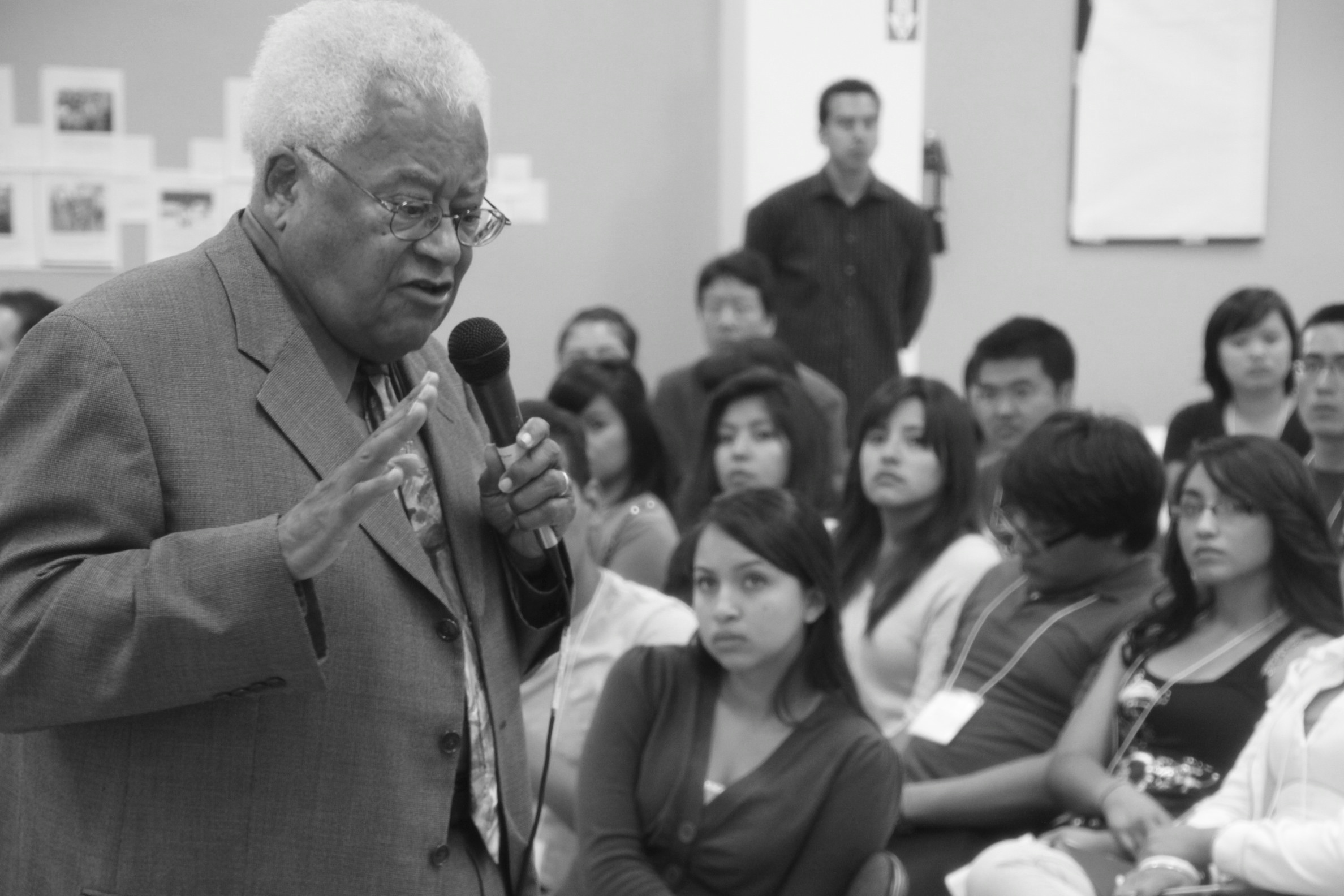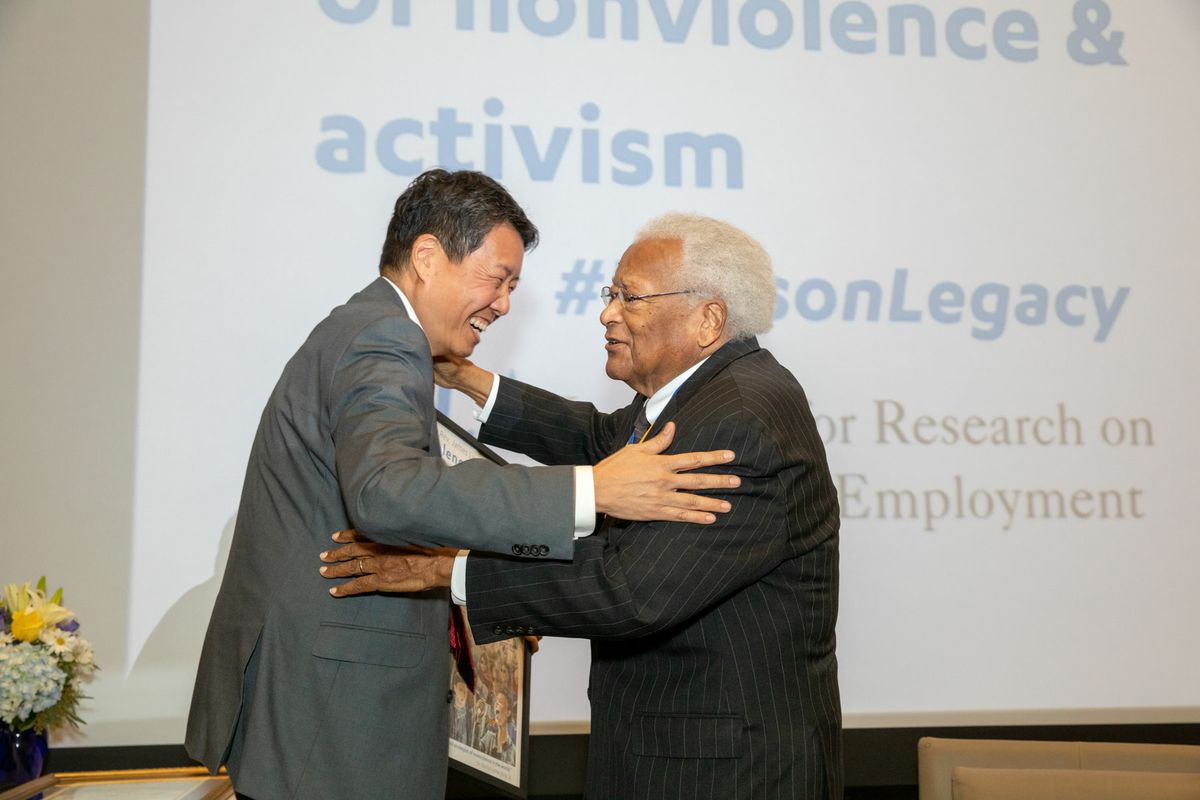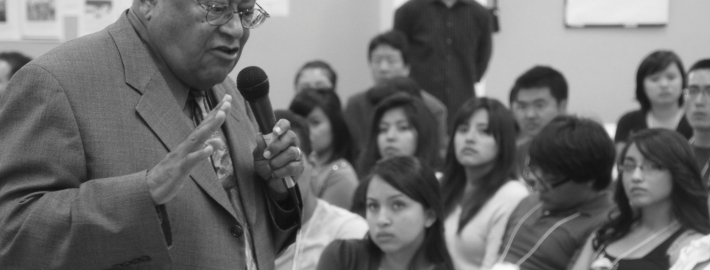A perfect tribute: UCLA names labor center building in honor of Rev. James Lawson Jr.
By Madeline Adamo

Rev. James Lawson loves speaking to the next generation of activists and leaders. Here he speaks to interns in the Dream Summer program, a fellowship opportunity for student immigrants and their allies. Photo credit: UCLA Labor Center
The Rev. James Lawson Jr. has always understood the importance of preparation. While a college student in the 1940s with a passion for civil rights, he took inventory of what was going on in a Cold War-era United States and decided he needed to get involved. And given the government’s reaction to demonstrations, he better get prepared to go to jail. He read books about people, like Gandhi, who had been imprisoned for being conscientious objectors to what they viewed as immoral government policies.
When the Korean War erupted in 1950, Lawson stood by his pacifist beliefs and refused to join the U.S. military. He was sentenced to federal prison for violating the country’s draft laws.
The preparation for prison had paid off. Thanks to his reading, Lawson emerged after serving 13 months of a three-year sentence even more dedicated to the philosophy of nonviolence — the work, he says, God commissioned him to do.
During the ensuing decades Lawson would become one of the key leaders of the national civil rights and labor rights movements and a very close friend of Martin Luther King Jr. The two were staunch proponents of the power of nonviolent civil disobedience and believed deeply in how strength of will and dedication to a cause prepared one to endure extreme opposition.
But for a man who helped shape the course of history, nothing could have prepared him, in mind and heart, for the honor of being the namesake of the UCLA James Lawson Jr. Worker Justice Center.
“I am extremely grateful beyond any kind of words,” said Lawson, who with King and other advocates for justice, canonized the intersection between labor and civil rights, strengthening the movement for both through the practice of nonviolence. For Lawson, the worker justice center and labor studies program — through which he has taught his annual UCLA class on nonviolence and social movements for the last 20 years — symbolizes the labor movement’s potential to inspire social and economic change
“I hope that it will become a symbol of the powers of life that are in each of us,” Lawson said, “and how we can cultivate those powers and enable ourselves and our community in Los Angeles to become what it can yet become.”
The formal dedication will occur on Saturday, Dec. 11, when a host of labor, community and political leaders will join UCLA Chancellor Gene Block and others in honoring Lawson. Among those present will be California State Sen. María Elena Durazo, a former Lawson student who helped secure $15 million in state funding to renovate and rename the UCLA Labor Center’s historic MacArthur Park building, which houses the center’s research, education and service programs in the heart of Los Angeles.
Lawson’s imprint on history through nonviolence
Naming this particular building in Lawson’s honor was a perfect fit, according to friends, former students and colleagues. The activist and theologian played key roles in some of the most famous social and worker justice demonstrations in American history:
• providing nonviolence and spiritual guidance to the nine Black students (the Little Rock Nine) who enrolled at an all-white public school in Little Rock, Arkansas, to test the school integration order from the Supreme Court’s decision in Brown v. Board of Education;
• spearheading the 1960 Nashville sit-in campaign to desegregate lunch counters marking a pivotal moment in launching the Civil Rights Movement;
• leading the Freedom Rides of 1961, which protested segregated bus terminals in the South, mobilizing a new generation of civil rights activists;
• organizing the Birmingham Campaign of 1963, which demonstrated against segregation in Alabama.
But Lawson is perhaps best known for his work behind the 1968 sanitation workers strike and his role in bringing King to Memphis, Tennessee, for the demonstration. Tragically, this is where Lawson’s dear friend was assassinated.
The two had previously led workshops together, during which Lawson partnered with King as his right-hand man in their mutual promotion of nonviolence. Among those who participated in those workshops, the late U.S. Rep. John Lewis, who was a student at American Baptist College in Nashville at the time.
By the early 1970s, Lawson moved to Los Angeles and became pastor of the Holman United Methodist Church, where he met leaders in the Los Angeles labor rights movement. Among these leaders was Durazo, then president of the hotel workers union of Los Angeles.
Durazo, who as a California state senator represents Central and East Los Angeles, said the mostly Latina hotel workers were inspired after he spoke to them. Lawson continued working with the union leading workshops about civil disobedience tactics like taking over the streets, hunger strikes and other peaceful shows of resistance to oppose the exploitation of hotel workers.
“He rekindled our movement through his teachings,” Durazo said.
For Lawson, the philosophy of nonviolence is “compassion in action.”
“Using the powers of the best that is in each of us … not only can we be transformed, but we can transform,” Lawson said.
Teaching UCLA students to be the leaders of the future generations
By the early 90s Lawson had cemented himself as a fixture in the Los Angeles labor movement, and it was a natural next step to join the UCLA Labor Center’s efforts to advance worker justice in Los Angeles County and beyond. The center, housed in the Institute for Research on Labor and Employment, launched the first labor studies program in the University of California system.
Kent Wong, director of the center since 1991, has been a friend and student of Lawson for almost 40 years. While a staff attorney at the Service Employees International Union, Wong was part of a group of people that met Lawson at his church to participate in workshops centered on nonviolence. Among the group was Durazo and other community activists who would years later go on to elected office bringing with them a support for the labor movement, such as Los Angeles Mayor Antonio Villaraigosa, U.S. Rep. Karen Bass, and City Councilmember Gilbert Cedillo.
“We were very grateful for his willingness to share his wisdom, his analysis and perspective,” said Wong, who in 2001 asked Lawson about teaching a UCLA class about nonviolence.

Kent Wong and Rev. James Lawson. Photo credit: Reed Hutchinson/UCLA
“It’s been very important to me that I’ve been teaching once a year at UCLA and that the opportunity has given me a chance to talk with a wide range of students,” said Lawson, who tailors the course to engage with current events but always through the lens of nonviolence and economic justice. “The emergence of nonviolence as a science of social change could be the most important paradigm called for in the 20th century.”
Even though Lawson’s students have included elected leaders like Durazo and Lewis, he said that each spring quarter’s new class of 300 UCLA students is always his most extraordinary one.
“I try to teach all the time that your big task in college is to be what you are and figure out what you are becoming, because that’s the immediate power that you can control and use,” he said.
The shift to online classes because of COVID-19 has allowed Lawson and Wong, who moderates the discussions, to bring in guest speakers who would not have flown to Los Angeles. In April, UCLA students heard from Angeline Butler, civil rights icon and former student leader of the Nashville sit-in movement. In May, anti-apartheid activist the Rev. Allan Boesak spoke to UCLA students from South Africa.
It comes as no surprise that Lawson plans to teach the course again in spring 2022. “This capacity, to be 93 years old and be agile, enabled to live well is a gift. I’m going to use it to expose as many different people as I can to the fact that we do not have to be a violent culture.”
Lawson, who received the UCLA medal, the campus’s highest honor, in 2018, said he humbly approves of the name dedication and is appreciative of the incorporation of “worker justice” in the name, a concept that to him is the future and hope for the nation.
“You’re in awe of the American history that exists in that man,” said Ron Herrera, president of the Los Angeles County Federation of Labor and a friend of Lawson. The 800,000-members federation, which is helping host Saturday’s dedication ceremony, has a partnership with the UCLA Labor Center that goes back several decades as Wong and Herrera, the highest-ranking union leader in Los Angeles, found themselves in the same circles.
Herrera said he’s pleased that the name dedication will tie Lawson to a place like UCLA, as well as recognize Lawson’s fight for workers as well as social justice for Black Americans.
“I think this is a huge opportunity to tell the American public that this man is a historic icon,” Herrera said. “He shouldn’t be left out of the history books.”
This article originally appeared in the UCLA Newsroom. For more news and updates from the UCLA College, visit college.ucla.edu.


 UCLA Labor Center
UCLA Labor Center
 Photo credit: UCLA
Photo credit: UCLA